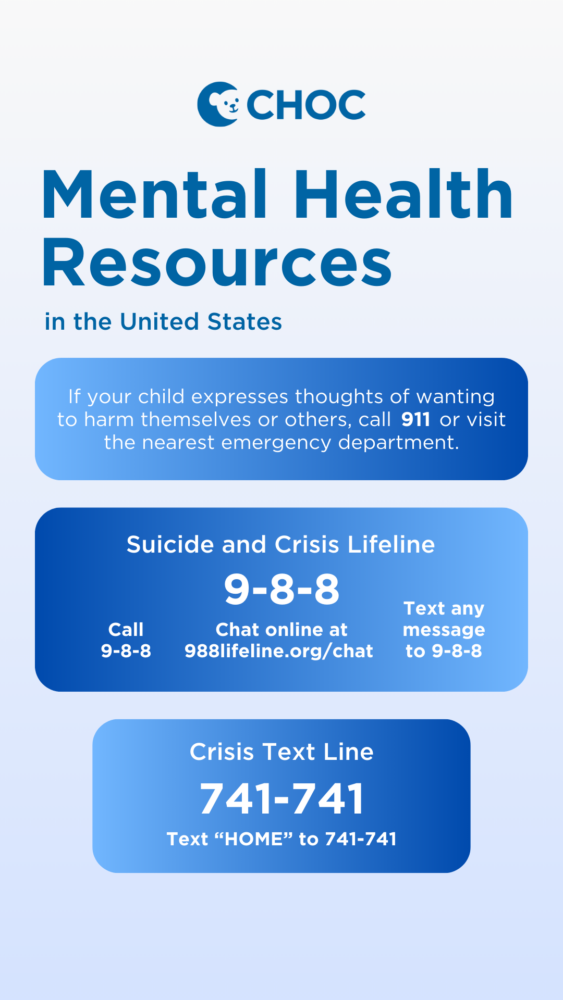MENTAL HEALTH GUIDE
Bipolar Disorder
Bipolar disorder is a mental health condition that causes severe changes in mood. These changes in mood can include emotional highs lasting from a few days to a few months and emotional lows lasting at least two weeks. These episodes of highs and lows may cause a lot of distress and result in significant changes to a person’s typical behaviors.
Crisis Resources
If your child expresses thoughts of wanting to harm themselves or others, call 9-1-1 or visit the nearest emergency department.
988 Suicide and Crisis Lifeline:
Call 9-8-8
Text any message to 9-8-8
Chat online at 988lifeline.org/chat
Crisis Text Line:
Text “HOME” to 741741
Save for later
Download, print or share on social media.

External resources
NAMIs Bipolar Disorder online resources and support groups
SAMHSA Bipolar Disorder online resources
UCLA’s Mood Disorders Clinic
www.semel.ucla.edu/mood/service/mood-disorders-clinic
Bipolar Disorder online resources and support groups
Verywellmind.com
Learn more about CHOC’s pediatric mental health services
At CHOC, we specialize in providing a full spectrum of pediatric mental healthcare, including inpatient, intensive outpatient and outpatient program services.
Get 24/7 advice from CHOC
Bipolar Overview
Bipolar disorder affects 9 million youth each year and often starts between the ages of 15 and 25. Below we explore what bipolar disorder is, what it can look like and who is most at risk for developing bipolar disorder.
What is bipolar disorder?
Bipolar disorder is a mental health condition with periods of emotional highs (known as mania or hypomania) and, at other times, periods of emotional lows (known as depression). These periods are also known as “episodes.” Episodes of mania or hypomania can last for weeks to months, while a depressive episode will last for at least a two-week period.
In bipolar disorder, episodes can be caused by high levels of stress, substance use or lack of sleep. Every person with bipolar disorder is unique and will have a different number of manic and depressive episodes in their life. Because of the strong emotional high, someone may not realize they are in a manic state and only recognize their behavior was different after the episode is over.
Symptoms of bipolar disorder
Sometimes, it can be hard to tell the difference between typical changes in mood and bipolar episodes. Teenagers can have quick shifts in mood or might engage in risky behavior that is typical for their stage of life. The symptoms below can help caregivers tell when a teenager’s behavior is outside of that typical range. A mental health professional can also help you better understand what your child is experiencing.
Manic or hypomanic episode (highs)
- Feeling very happy, elated or overjoyed
- Talking very quickly to the point where it is hard to interrupt them
- Feeling full of great new ideas and having important plans
- Easily distracted, irritated or agitated
- Some people may have delusions (having a strong belief that is not based in reality and is not shared by others)
- Some people may experience hallucinations (seeing or hearing things that others do not see or hear)
- Experiencing illogical thinking (saying words that do not make sense or switching from one topic to another mid-sentence)
- Not sleeping, or sleeping for only a couple of hours every night, but still feeling full of energy
- Eating very little
- Making decisions or saying things that are out of character or are risky or harmful.
Depression episodes (lows)
- Feeling sad, empty or hopeless most of the time
- Feeling irritable
- Trouble falling asleep, trouble staying asleep or sleeping more than usual
- Feeling very tired or having little energy
- Feelings of worthlessness or excessive or inappropriate guilt
- Trouble concentrating
- Thoughts of dying or suicidal thoughts
- Changes in appetite
Between mania and depressive episodes, youth with bipolar disorder may have periods when they have a “typical” mood.
Myths about bipolar disorder
Bipolar disorder is not very well understood by society, and there are a lot of myths about the condition. Let’s dispel a few of them:
Myth: Bipolar disorder is rare.
False. It is estimated about nine million youth have bipolar disorder episodes each year.
Myth: People with bipolar disorder have rapid mood swings (such as feeling depressed for a few hours, then hyper or very happy for a few hours) in the same day.
False. People with bipolar disorder have episodes of mania and depression which each last a few days to a few months, not just several hours. Also, these episodes cause a lot of changes in someone’s energy, activities and sleep.
Myth: Mania is always fun and exciting.
False. Although some people with mania may feel good and have a lot of energy, people often will also feel out of control and can easily switch to irritation. Being out of control may lead someone to do reckless or unsafe things that affect their relationships, finances or health.
Myth: People with bipolar disorder can stop taking medications once their episodes are under control.
False. Taking medication and going to treatment helps prevent future episodes. If someone stops taking their medication and attending therapy, the episodes and symptoms will return.
Who experiences bipolar disorder?
In the United States, 9 million youth experience bipolar symptoms each year.
Bipolar disorder can affect anyone, and symptoms often start between the ages of 15-25.
People with family members who have been diagnosed with bipolar disorder are more likely to be diagnosed with bipolar disorder themselves.
What does treatment look like?
Bipolar disorder is a lifelong condition; there is no current cure. Regular, long-term involvement with treatment can help prevent, reduce and manage bipolar symptoms and episodes. Treatment can look different depending on each person and their needs. In general, people benefit the most from two types of treatment: medication and mental health services.
For most people, medication is an important part of recovery. Medication can help reduce some of the symptoms of bipolar disorder and, in some cases, prevent the episodes altogether. Finding the right medication(s) often takes some time and may require trying several options. If one medication doesn’t work well or causes unwanted side effects, there are many others to try. Medications may need to be changed or adjusted over time. Bipolar symptoms and episodes will worsen or return without medication.
The other form of treatment is mental health services, which can involve professionals such as psychologists, psychiatrists, social workers, therapists or others. Treatment can include working one-on-one with a therapist or doing family and group therapy. Often, treatment will focus on teaching someone about bipolar symptoms, helping them communicate and ask for support from those around them, learning about the unhealthy, negative beliefs they have about themselves and helping them monitor and balance their own daily routines (sleeping, waking and mealtimes).
Other options for treatment can include asking for support and help from teachers, school counselors and workplaces. Some schools and jobs may be able to offer extra support or help make schedule and assignment changes that work better for people with bipolar disorder.

Learn more about CHOC’s Pediatric Mental Health Services
CHOC Hospital was named one of the nation’s best children’s hospitals by U.S. News & World Report in its 2024-25 Best Children’s Hospitals rankings and ranked in the behavioral health specialty.

Tips for parents and caregivers of children with bipolar disorder
Because bipolar disorder can happen without warning and the symptoms can feel confusing, it can be challenging for caregivers and providers to know what is going on at first or how to help. Below are some tips on how to support a child with bipolar disorder:
Show your love
Children need love, empathy and to feel safe. Let them know you care and that their feelings are important. Be present, sit with them and reassure them that they are safe.
Stick to a routine
Routines can help manage bipolar episodes and help your child notice an early change in their mood. It is important to make sure your child has a regular sleep schedule, as disrupted sleep can trigger a hypomanic or manic episode and make depressive episodes worse.
Medication
Medication can be one of the most important and helpful treatments for bipolar disorder. It is important to keep track of and monitor your child to make sure they are taking medication as prescribed.
Reassure your child
Let your child know you are going to help them feel safe and that therapy, going on with day-to-day life and medications can help.
Develop a safe environment
Create a safety plan with a professional and find ways to make your home safer for your child. Ask your child what will help them feel safe and in control.
Reach out to your child’s doctor, therapist or psychiatrist
Finding professional help early on is important and provides the best hope for recovery. Treatment will help reduce and manage bipolar episodes. People with bipolar disorder may benefit from therapy/counseling, medications, peer support and other services.
Take care of yourself
Find time to take care of yourself and take part in meaningful activities. You also have to take care of yourself in order to care for your child.

Tips for kids and teens with bipolar disorder
Bipolar disorder episodes can be confusing and stressful at first, which makes it hard to understand what is happening and to ask for help. These tips will help you manage some of the symptoms of bipolar disorder and the distress they can cause.
Use coping skills to manage distress
Experiencing mania and depression can be scary. Although there is little we can do to make the episode go away in the moment, we can do relaxing activities to reduce distress, which can make the symptoms better. Try taking a few deep breaths, saying some encouraging statements to yourself and asking for a helpful adult to distract you from what you are going through.
Take care of yourself
Try to keep up with your routine, including eating, sleeping and going to school regularly. Reach out to a caregiver if you notice you are struggling to keep up with your routine.
Sleeping
Not getting enough sleep can trigger depressive or manic episodes. Try to get enough sleep and to keep up with a regular sleeping schedule. Keeping a sleep diary can help you notice changes to your sleep schedule.
Medication
Medication is very helpful to keep your mood balanced. Even if you start feeling better, you should always talk to a psychiatrist before making any changes to your medications. If you don’t take medication as prescribed, your symptoms could worsen.
Remember you’re not alone
These experiences can be scary and upsetting, AND there are millions of other people out there going through something similar (including famous people!). Even if someone else is not going through exactly what you are experiencing, there are people in your life who want to help (including your caregivers, therapist or psychiatrist).
Seek help
Seeking treatment for bipolar disorder can be hard because your mood feels unpredictable. It is important to find treatment and to stick with it, because sometimes it can take a little while to figure out what combination of medications, therapy and other supports are most effective for you.

Learn more about CHOC’s Pediatric Mental Health Services
CHOC Hospital was named one of the nation’s best children’s hospitals by U.S. News & World Report in its 2024-25 Best Children’s Hospitals rankings and ranked in the behavioral health specialty.
Bipolar disorder recommended reading
Related guides
Bipolar disorder can sometimes occur alongside other mental health conditions, including anxiety, attention-deficit/hyperactivity disorder, psychosis and substance use disorder. For more information on other mental health conditions that can occur with bipolar disorder, please visit our other mental health guides.
Bipolar disorder books
- The Bipolar Disorder Survival Guide, Dr. David J. Miklowitz
- Owning Bipolar: How Patients and Families Can Take Control of Bipolar Disorder, Michael G. Pipich
Additional Resources
The guidance on this page has been clinically reviewed by CHOC pediatric experts.
For more health and wellness resources from the pediatric experts at CHOC:
Sign up for the Kids Health newsletter.
The contents of this webpage, including text, graphics, audio files, and videos (“Materials”), are for your general information only. The Materials are not intended to substitute qualified professional or medical advice, diagnoses, or treatments. CHOC does not recommend or endorse any specific tests, physicians, products, procedures, or other information that may be mentioned on or linked to this webpage. Always call your physician or another qualified health provider if you have any questions or problems. If you think you may have a medical emergency, call your doctor, go to the nearest emergency department, or call 911.
For more health information for your family visit health.choc.org

